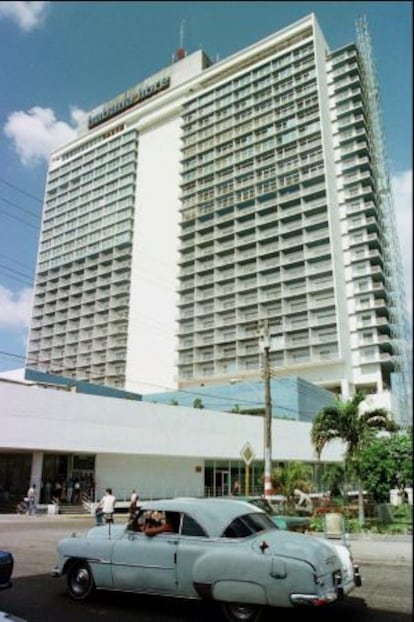What to do about US firms’ expropriation claims against Cuba?
Nearly 6,000 companies say they are owed more than €7 billion in compensation


How much will it cost for Cuba and the United States to reconcile their differences? There are 5,913 US companies that together say they are still owed, with interest, more than $7 billion (€5.8 billion) by the Cuban government for expropriating their properties on the island after Fidel Castro came to power in 1959.
The US economic embargo introduced in 1962 was put in place as the result of these nationalizations without compensation. The sanctions against Havana have lasted more than 50 years and, even with President Obama’s announcement of the normalization of diplomatic relations, there is no guarantee that they will be lifted in the near future. Now the sanctions have since been outlined and extended though the 1996 Helms-Burton Act, the US Congress is the only body that can revoke them.
But Cuba has its own grievances. The blockade, as Havana calls it, has cost the island around $100 billion in losses.
“It is not clear what effect these [diplomatic] changes will have,” the Office of Foreign Litigation at the US Justice Department, which is handling the nearly 6,000 claims by American businesses, has stated.
The Poblete Tamargo law firm, which specializes in such claims, issued “an alert to all clients” advising them that the issue could be brought up when US and Cuban representatives hold their first official talks since the breaking of relations at the end of January.
A US State Department spokesman said no specific date had yet been set to discuss the expropriations
A US State Department spokesman said that while the issue “continues to be a priority for the government,” no specific date had yet been set to discuss the expropriations.
According to some experts, the issue is not a priority. “It won’t happen soon, and I don’t think there is a remote chance that this will become a pre-condition or even a bump in the road,” said Pedro Freye, a Cuban-American lawyer who specializes in Latin American issues, including the US embargo.
Freye believes that the matter will only be brought to the forefront when US lawmakers seriously begin to consider lifting sanctions. The Helms-Burton Act stipulates a number of changes and lists special provisions that will be needed in Cuba before the embargo can be lifted and diplomatic relations between the two nations fully restored.
The list of grievances
5,913 US firms still hold claims against Havana for the expropriations that took place after Fidel Castro came to power in 1959. They claim they are owed, with interest, more than $7 billion (€5.8 billion).
The nationalization of properties without compensation triggered the US embargo, which has been in place since 1962.
Havana claims that the "blockade" has cost Cuba around $100 billion in losses.
In 2005, the then-Bush administration asked the Creighton University of Nebraska to undertake a study to find “a mechanism” for resolving pending claims by both sides. The university proposed the creation of a bilateral arbitration court through a presidential order or treaty that could come up with different settlements, including monetary compensation for smaller claims and “alternatives,” such as tax benefits and investment incentives, for companies seeking larger settlements.
“Cuba is not Kuwait. It doesn’t have large cash reserves that would permit it to pay multi-million-dollar compensations,” Freye said.
On the other hand, big multinationals that have pending claims – such as Coca-Cola, Colgate-Palmolive, Exxon and Texaco – could be at an advantage in the future if they win a deal that would permit them to easily invest in the Cuba.
Robert Muse, another lawyer who advises firms with claims, said it was important that there was some type of flexibility when it came to negotiating with Cuba because “it could be a good way for new investments to take off on the island” where companies from other countries have been dealing for years.
Cash settlements and incentives
It was not only US firms that went uncompensated following the nationalizations that took place when Fidel Castro came to power on January 1, 1959. Although they were smaller in number, companies from Spain, Canada and France also had their properties confiscated. However, these nations reached agreements with Havana over compensation years ago.
Money was paid out in lump sums, not to the companies holding claims, but to the respective governments. Compensation was made in payments and a part of it was made through incentives.
In Spain’s case, Madrid and Havana reached an agreement in March 1988 where Cuba agreed to pay 5.4 billion pesetas (€32.5 million) in compensation to Spaniards who suffered losses as a result of Castro’s expropriations. A good part of the sum – 3.6 billion pesetas – was not paid in cash but through incentives. The rest of the money was paid in installments.
Tu suscripción se está usando en otro dispositivo
¿Quieres añadir otro usuario a tu suscripción?
Si continúas leyendo en este dispositivo, no se podrá leer en el otro.
FlechaTu suscripción se está usando en otro dispositivo y solo puedes acceder a EL PAÍS desde un dispositivo a la vez.
Si quieres compartir tu cuenta, cambia tu suscripción a la modalidad Premium, así podrás añadir otro usuario. Cada uno accederá con su propia cuenta de email, lo que os permitirá personalizar vuestra experiencia en EL PAÍS.
En el caso de no saber quién está usando tu cuenta, te recomendamos cambiar tu contraseña aquí.
Si decides continuar compartiendo tu cuenta, este mensaje se mostrará en tu dispositivo y en el de la otra persona que está usando tu cuenta de forma indefinida, afectando a tu experiencia de lectura. Puedes consultar aquí los términos y condiciones de la suscripción digital.








































